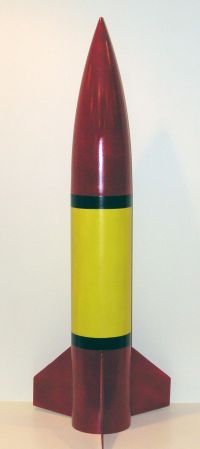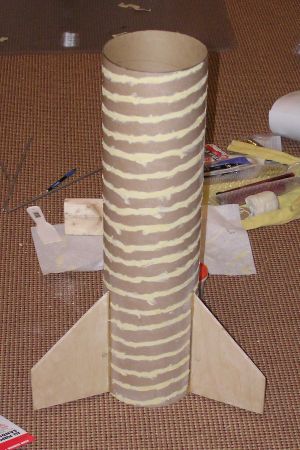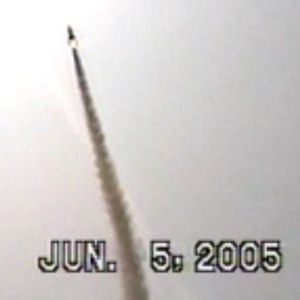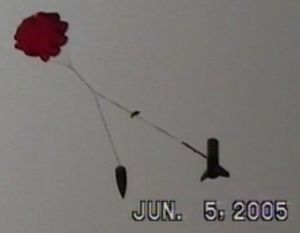| Construction Rating: | starstarstarstarstar_border |
| Flight Rating: | starstarstarstarstar_border |
| Overall Rating: | starstarstarstarstar_border |
| Manufacturer: | LOC/Precision  |

Brief:
A short fat rocket capable of flying on H through J engines.
Construction:
All components were standard LOC components.
- 1 Huge plastic nose cone
- 1 7.67 inch. diameter paper bodytube
- 1 38mm paper motor mount tube
- 2 7.5-1.5 inch plywood centering rings
- 4 1/4 inch Plywood fins
- 1 54 inch nylon parachute
- 1 Eyebolt assembly
- 1 1/4 inch paper launch lug
- 1 9/16 tubular nylon shock cord w/pre-sewn loops
I purchased this rocket from Commonwealth Displays for use as my L1 certification rocket. I built it stock but added a 38mm Aero Pack motor retainer, a Nomex® heat shield, and a forged eyebolt.
After reading the minimalist instructions and inspecting the parts, I began construction by drilling a hole in the forward centering ring and installing the forged eye bolt which I had purchased separately. (The kit came with a cheap, inadequate eyebolt which was not strong enough for a rocket of this size.) I then glued the two centering rings in place using West Systems epoxy. The aft centering was installed slightly further forward than the instructions recommended so that the Aero Pack retainer would fit. While the epoxy dried, I decided to slot the tubes. After marking out the slots with a pencil, I used a sharp X-Acto knife and a metal ruler to carefully cut the slots. While time consuming, this step is not particularly difficult as long as you take your time and do not attempt to cut through the tube on your first pass. It took me about a 1/2 hour to cut the slots. After the epoxy on the motor mount had hardened, I flipped it over and applied more epoxy to the other side of the centering rings. I also locked the eyebolt in place with a drop of epoxy. The next day, I installed the motor mount into the tube and epoxied the aft centering ring in place. After the epoxy had cured, I flipped the rocket over and epoxied the forward centering ring. While the assembly had dried, I airfoiled the fins using a belt sander. Unfortunately, the fins do not reach the motor mount. (Current kits now use LOC's Loc-N-Fin technology which rectifies this problem.) After tacking the fins in place with a few drops of CA, I used a little epoxy to permanently attach the fins. The method I use for fin filleting is simple and effective but takes 4 days to do on a 4 fin rocket. Basically, I lie the rocket on the ground so that two fins are facing upwards and then use a West Systems Syringe to squirt West Systems epoxy in a line where the fin meets the tube. (Do not try this with the cheap epoxy you can buy at the hardware store.) The epoxy naturally flows to form a perfect fillet. I then check on the rocket every ten minutes for an hour and wipe the epoxy that has dripped off of the forward and aft parts of the fin with a paper towel. The next day I rotate the rocket to the next set of fins and repeat. While it has to be done over a period of several days, the actual amount of time and effort this takes is minimal and the results are consistently perfect. To attach to shock cord to the nose cone, I deviated from the instructions and drilled two 1/2 inch holes in the nose cone. I waited to actually install the recovery system and Aero Pack until after I had finished painting the rocket.
 After finishing the rocket, I removed the masking tape that I had wrapped around the end of the motor mount and attached the Aero Pack with JB Weld. I then hooked up the recovery system. First I threaded the shock cord through the 2 holes I had drilled in the nose cone and pull one end of the shock cord through the loop on the other end. I then slid the shock cord through the hole in the Nomex heatshield and used the included quicklink to attach the shock cord to the eyebolt installed in the forward centering ring. I then used the standard attachment method on the parachute (around the shock cord and through itself) to attach the parachute, finishing the rocket.
After finishing the rocket, I removed the masking tape that I had wrapped around the end of the motor mount and attached the Aero Pack with JB Weld. I then hooked up the recovery system. First I threaded the shock cord through the 2 holes I had drilled in the nose cone and pull one end of the shock cord through the loop on the other end. I then slid the shock cord through the hole in the Nomex heatshield and used the included quicklink to attach the shock cord to the eyebolt installed in the forward centering ring. I then used the standard attachment method on the parachute (around the shock cord and through itself) to attach the parachute, finishing the rocket.
Pros:
- Simple but effective construction
- Wood components (fins & centering rings) were high quality
- A very nice shock cord
Cons:
- Minimal instructions
- No motor retention included
- Eyebolt inadequate for high power flights
- No precut fin slots
- Fins do not reach motor mount (since I built this kit, it has been redesigned with Loc-N-Fin Technology)
Finishing:
I decided to go all out on the paint job for this rocket, so I spent about three weeks finishing it.
I started by filling in the tube spirals with watered down Elmer's Wood Filler. After sanding off the excess wood filler with 100 grit sandpaper, I primed the rocket with gray Krylon Primer. I then sanded this down with 220 grit sandpaper and applied another layer of primer. After repeating this several times (during later coats I wet sanded), I finally had a near perfect finish. I then painted the body of the rocket with yellow Krylon and the nose cone with red Krylon paint. I applied several coats, wetsanding between coats with 400 grit sandpaper. After finishing painting the body of the rocket yellow, I masked off the top and bottom of the rocket with 40mm Tamiya masking tape (this is the extremely high grade kind) and covered the rest of the rocket by taping garbage bags on with cheap masking tape. I then painted the top and bottom of the rocket red. After I had applied several coats of red and it had dried, I carefully removed the masking tape. I then masked off the ends of the rocket again and painted it with Krylon black. After removing the masking tape and garbage bags, I painted the entire rocket with Krylon clear coat.
Construction Rating: 4 out of 5

Flight:
I first flew this rocket at NOVAAR for my L1 certification flight. After packing the recovery system, loading the Aerotech I211 motor, and passing the RSO's safety check, I loaded the rocket onto the pad. The flight was absolutely beautiful until the motor suffered a premature ejection almost immediately after burn out. Despite the early ejection, I still thought that I had successfully certified until I reached the rocket, which landed within 50ft of the pad, where I discovered that the shock cord had torn an enormous 24 inch zipper in the body tube.
Fortunately I was able to certify at the same launch with a stock LOC Lil' Nuke which I happened to have with me and an H128. (Note: I don't recommend this as the rocket barely survived the flight.)
I was able to repair the rocket using part of a LOC coupler and some fiberglass. The rocket isn't perfectly round anymore, but it still flies perfectly and you can't tell from more than 10ft away.
Since the mishap, I have flown the rocket once more at a METRA launch on another I211. The flight was beautiful and the parachute ejected at the correct time.

Recovery:
As long as the motor retention and parachute protection are added, this rocket has perfect flights. Because of it's shape and size, it's a good low flying rocket for smaller club fields.
Flight Rating: 4 out of 5
Summary:
This is a great looking rocket. It could be improved (motor retention, precut fin slots, parachute protection, better instructions, etc.) but can by upgraded by any flyer with a lot of mid or high power experience into a fantastic rocket. I would definitely recommend this kit.
Overall Rating: 4 out of 5
Other Reviews
- LOC/Precision Warlock By Joe Cacciatore
Single 38 mm engine rocket almost 8" in diameter and 4.4' high with chute, plywood fins, cardboard tube and plastic nosecone. High quality cardboard tube, engine mount tube, three plywood fins, two plywood centering rings, eyebolt, quick link, 60" ripstop nylon chute, and 22' x 1/2" shock cord. It comes with no previsions for motor retention. I have bu ...
 |
 |
Flights
 |
 |
Sponsored Ads
 |
 |


![Crip Loc [Explicit] Crip Loc [Explicit]](https://m.media-amazon.com/images/I/61n++-zf3AL._SL500_.jpg)
![Gs & Loc's [Explicit] Gs & Loc's [Explicit]](https://m.media-amazon.com/images/I/61nsOgACzML._SL500_.jpg)
![Shorty 2 Loc [Explicit] Shorty 2 Loc [Explicit]](https://m.media-amazon.com/images/I/410xNJ6vAZL._SL500_.jpg)


![La sale matière [Explicit] La sale matière [Explicit]](https://m.media-amazon.com/images/I/51vWcn2nMKL._SL500_.jpg)




J.J.K. (August 19, 2006)